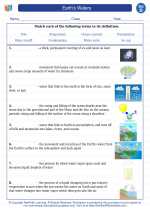Oceans
Oceans are vast bodies of saltwater that cover nearly 71% of the Earth's surface. They play a crucial role in regulating the planet's climate, providing a habitat for countless marine species, and supporting various human activities such as fishing, shipping, and tourism.
Ocean Formation
Oceans were formed millions of years ago through a process called seafloor spreading, where tectonic plates move apart, creating space for the oceanic crust and allowing magma to rise and solidify, forming new oceanic crust.
Ocean Zones
Oceans are divided into different zones based on depth and distance from the shore. These zones include the intertidal zone, neritic zone, oceanic zone, and benthic zone, each of which has its own unique characteristics and inhabitants.
Ocean Currents
Ocean currents are continuous, directed movements of seawater generated by forces such as wind, temperature, and salinity gradients. They play a crucial role in distributing heat around the Earth and influencing weather patterns.
Marine Life
Oceans support a diverse array of marine life, including fish, mammals, invertebrates, and microorganisms. The unique ecosystems found in oceans are home to a wide variety of species, many of which are yet to be discovered and studied.
Human Impact
Human activities such as pollution, overfishing, and climate change have significantly impacted the health of the world's oceans. It is crucial for us to understand and mitigate these impacts to ensure the long-term sustainability of ocean ecosystems.
Study Guide
- Describe the formation of oceans and the role of tectonic plates in this process.
- Explain the different ocean zones and the unique characteristics of each zone.
- Discuss the factors that influence ocean currents and their importance in regulating climate.
- Identify and describe at least three marine species and their adaptations to ocean life.
- Analyze the human impact on oceans and propose measures to protect and conserve ocean ecosystems.
By understanding the formation, characteristics, and ecological significance of oceans, we can appreciate the vital role they play in sustaining life on Earth and work towards their conservation and sustainable use.
[Oceans] Related Worksheets and Study Guides:
.◂Science Worksheets and Study Guides Fourth Grade. Earth's Waters

 Worksheet/Answer key
Worksheet/Answer key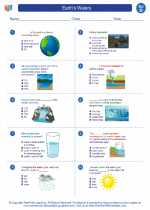
 Worksheet/Answer key
Worksheet/Answer key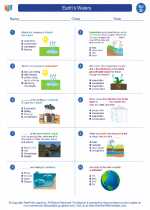
 Worksheet/Answer key
Worksheet/Answer key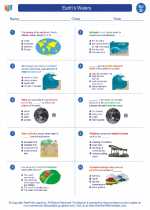
 Vocabulary/Answer key
Vocabulary/Answer key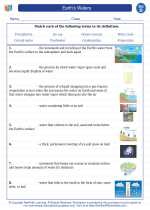
 Vocabulary/Answer key
Vocabulary/Answer key